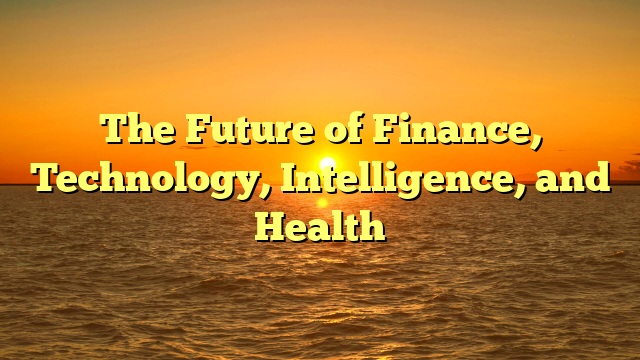—
In today’s rapidly evolving world, the interconnectedness of financial systems, technological advancements, intelligence, and health has become more apparent than ever. These fields are not only reshaping how we live and work but also paving the way for innovative solutions to some of society’s most pressing challenges. This article explores how each of these areas is evolving and the impact they are having on individuals, businesses, and the global economy.
—
The Future of Financial Systems and Wealth Management
In the world of finance, traditional systems are undergoing significant changes due to digital transformation, blockchain technology, and cryptocurrencies. These developments are challenging the old paradigms of banking and investment management. As more people adopt digital payment methods, the demand for secure, decentralized financial solutions is growing. Blockchain technology, for instance, is enabling transparent, efficient, and secure transactions, eliminating the need for intermediaries.
The role of artificial intelligence (AI) in finance is also gaining prominence. AI algorithms are used for data analysis, risk management, and predictive modeling, allowing investors and financial institutions to make more informed decisions. Robo-advisors, for example, have gained popularity for offering automated investment strategies, making financial planning accessible to a wider audience. With the growing integration of AI, the future of finance is poised for even greater automation and personalized financial services.
—
The Role of Technology in Driving Future Innovation
Technological innovation is the primary driver of progress in fields such as finance, healthcare, and manufacturing. seven77 login of AI, machine learning, and data analytics is transforming how businesses operate and how people interact with technology. From smart devices to cloud solutions, these advancements are enabling industries to be more efficient, responsive, and data-driven.
In addition to improving operational efficiency, AI and automation are enabling industries to innovate more rapidly. Businesses are using machine learning to optimize supply chains, develop personalized products, and enhance customer engagement. As automation becomes more widespread, we can expect industries to become increasingly agile and adaptable.
—
AI and Intelligence: A New Era of Problem Solving
AI’s progress has made it one of the most significant breakthroughs in modern science and technology. By enabling machines to perform tasks that typically require human intelligence, AI is changing how we interact with technology. The development of AI systems capable of learning, reasoning, and making decisions is opening new possibilities across sectors, from personalized medicine to smart cities.
Cognitive computing is advancing at an extraordinary pace, with systems that can understand, reason, and interact more naturally. This level of intelligence is becoming essential in industries like healthcare, where AI is driving innovations in personalized treatments and healthcare management. As these technologies evolve, they will become increasingly indispensable in improving outcomes and efficiency across various sectors.
—
Health: The Future of Well-Being
Technology is revolutionizing healthcare, enabling faster diagnoses, more personalized treatments, and improved patient outcomes. Wearable devices, telemedicine, and AI-powered diagnostics are transforming the way doctors and patients approach health management. AI’s ability to predict diseases, analyze treatment efficacy, and personalize care is accelerating the shift towards more proactive and individualized healthcare systems.
AI is also transforming the field of personalized medicine by analyzing large datasets to identify patterns and correlations. These insights are helping doctors tailor treatments to individual patients, improving effectiveness and reducing side effects. As AI evolves, it will play an even greater role in the development of new therapies and vaccines, improving public health globally.
—
Ultimately, the integration of finance, technology, intelligence, and health is driving monumental shifts in how we live and work. These fields are complementing each other, creating a more interconnected and innovative world. The ongoing developments in AI, automation, and digital technologies will continue to shape the future, offering vast potential for improving financial systems, technological infrastructure, intelligence capabilities, and healthcare delivery.
